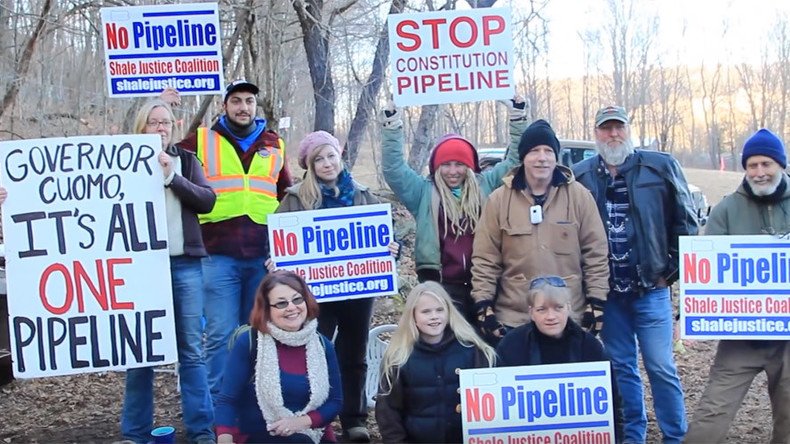Maple syrup farmers lose fight against fracking pipeline

A family of maple syrup farmers in Susquehanna County, Pennsylvania cannot stop their trees being cut down to make way for a new fracking pipeline project owned by billion dollar oil companies, a federal judge ruled Friday.
The Holleran family opposes the seizure of their maple grove to make way for the new 124-mile-long Constitution Pipeline.
The group faced contempt of court charges for obstructing tree cutting on their property.
Help protect the Holleran family maple syrup co. from Constitution pipeline clearcutting! https://t.co/l8VeV8tMlIpic.twitter.com/NfZSW88tpG
— Clean Air Council (@cleanaircouncil) February 8, 2016
The land is being taken by eminent domain to be turned into a 120ft wide passageway for the pipeline. The $875 million proposed project would carry gas from fracking sites in the northeastern Pennsylvania borough of Montrose into the capital of New York state, Albany.
On January 29, the Federal Energy Regulatory Commission (FERC) gave a partial notice to proceed with tree cutting on the 25 mile Pennsylvania side of the pipeline.
Companies backing the pipeline sought permission to cut trees along the New York side, but were blocked by environmental groups and state Attorney General Eric Schneiderman.
Buzz: Attorney General jumps into gas pipeline tree-cutting dispute: Attorney General Eric Schneiderman will b... https://t.co/wtVMzqbrjT
— tubusiness (@tubusiness) January 14, 2016
Those who oppose the pipeline argue Constitution is getting a jump on the project despite not having permits in New York and are calling for a stop to the tree cutting in Pennsylvania.
Lawyer Mike Ewall of Energy Justice Network said, “Constitution Pipeline Company is threatening this family’s livelihood for a pipeline that may never be built. They still don’t have FERC’s permission to construct, yet they bully and intimidate landowners while offering paltry compensation for taking their land.”
The defendants confronted tree cutters on their property on February 10.
Hollywood Actor James Cromwell joined a family's fight to save maple trees from a pipeline project in Susquehanna Co pic.twitter.com/NKdxVQRVG3
— Jon Meyer (@JonMeyerWNEP) February 5, 2016
The contempt of court charges were dismissed when state trooper Monty Morgan was unable to identify the defendants.
The judge stood by his earlier decision to grant eminent domain to the pipeline company and said US marshals would be directed to arrest people interfering with the tree cutting.
This means the family has no right move the tree cutters off their land, despite their lack of consent and loss of livelihood.
Some 200 maple trees are to be cut, about 80 percent of the maple trees on the property. The family want to be fairly compensated for the loss of land, rather than stop the pipeline.
Family spokeswoman Megan Holleran said, "We know they're allowed to cut down the trees, but we're still hoping they may not. My family's not going to do anything to violate the court order."
Federal wildlife rules dictate that the company may only cut trees between November 1 and March 31 in order to protect migratory birds and the endangered long eared bat. If the deadline passes before the trees are cut, the company will be forced to wait until fall.
The pipeline is a partnership of $1 billion Texas company Cabot Oil; $12 billion Oklahoma company Williams; Piedmont Natural Gas, also from Texas; and the public utility holding company WGL serving the Washington DC area.
#Fracking Documenting the latest spill by Cabot OIl and Gas of drilling mud and diesel : the removal of... http://t.co/fR6zY1VLTD
— OccupyYoungstown (@OccupyYtown) May 27, 2014
Cabot has a long history of spills and contaminated drinking water and killed fish with high levels of methane in the Dimock, Pennsylvania area in 2009, after up to 8,000 gallons of potentially-carcinogenic drilling fluids spilled from a well site.
In 2014, the Department of Environmental Protection fined Cabot $120,000 for a storage tank explosion and spill in Susquehanna County.
A Williams gas pipeline ruptured in Pennsylvania in January, forcing residents to evacuate.
#Breaking144 – Residents told to evacuate/stay inside after pipeline explosion at Williams Gas plant in Louisiana ‘ https://t.co/YtL5Ma8ToN
— #AceBreakingNews (@AceBreakingNews) October 8, 2015
The company had a major leak at a gas plant in Colorado in 2012. The leak was not revealed until 2013, when lethal levels of benzene levels were recorded, which had polluted the groundwater and soil.
#Williams#OilGas in news, again... #WestVirginia pipeline #EXPLOSION Residents Ordered To Evacuate Area http://t.co/lkQubJh1Q5#copolitics
— Piceance Watchdog (@PiceanceDog) March 23, 2013
The Transpacific Trade and Investment Partnership (TTIP) agreement could allow "private companies to sue governments for loss of profits connected to regulation" through "investor state dispute settlement", according to the Guardian.
If it passes, families like the Hollerans will have even less power to resist the detrimental effects of oil and gas companies.
You thought #ISDS was bad? #TTIP’s “regulatory cooperation” is even worse. - https://t.co/Rh8SwTfoBE democracy under serious threat
— Glyn Moody (@glynmoody) February 14, 2016
. @gra_carley@ManchanMagan We are 100% opposed to #TTIP. Check out our campaign @TTIPBeware and ttip2016.eu. Really concerned with #ISDS.
— Green Party Ireland (@greenparty_ie) February 19, 2016












